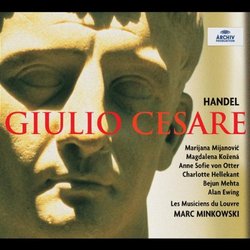Minkowski's (overdue) return to Handel
Dr. Peter J. Glidden | Gli Angeli, California | 09/04/2003
(5 out of 5 stars)
"I'll admit that I am a big fan of Marc Minkowski and that I've followed him from his first Handel recordings (Amadigi and Teseo) to his Offenbach and Strauss. However, while his "modern" forays have been quite nice (especially the Orphée aux Enfers), I'm glad that he has finally remembered what he does best: the Baroque, and, namely, Handel. His Dixit Dominus has converted several people I know to "classical" music and his Ariodante, with the thrilling casting of Anne Sophie Von Otter and Ewa Podles, will be hailed as immortal (see my review). This new installment goes straight for the top: Giulio Cesare. The orchestra - particularly the solo instruments of cor di caccia, Hector McDonald, and violin, Florian Deuter, are superb - is amazing, the tempi are just right, quick and languid by turns. Handel should be fast - when he shouldn't be slow, it's all about giving the music it's due. The vocal soloists are also generally great, with some greater than others. The tricky title role sung by Marijan Mijanovic is well chosen. It took me awhile to recall who she reminds me of and I think I've got it: Carolyn Watkinson, but truly with her mezzo power and passion in a contralto part (Watkison's contralto singing, such as the role of Galatea, is quite different). I'm amazed to hear myself give her such high praise as I was rather unmoved by her contribution to the Arcadian duets (Emmanuel Haïm), but maybe it's just a matter of learning to love something new (and something old). Magdalena Kozena sings Cleopatra, which is also amazing since she debuted as an alto/mezzo and has sung tons of that material. Her Cleopatra is solid, thrilling, yet I still long for the coloratura soprano in this part - which we don't have a recording of! Where are Nathalie Dessay, Sandrine Piau, or Sylvia McNair? The mother-son duo, Cleopatra and Sesto, with their fabulously erotic music, which, sung by two women as Handel wrote the parts, moves from incestuous to lesbian in the blink of an ear! - is Charlotte Hellenkant and the sublime Anne-Sophie Von Otter. Hellenkant has the amorous maternal role down pat while Von Otter, though perhaps a bit less in this role, is, as the liner notes claim, one of the best singers of her generation. I'm glad also to see former boy soprano current countertenor king Bejun Mehta in a major role, Tolomeo. This is actually a role that has burned more than one male alto as it requires big guns both in terms of breath and pure vocal ability, which Mehta has in spades. Achilla is sung by Alan Ewing (Polyphemus on Christie's Acis and Galatea) and is sufficiently bullying and blustering for the part. For another interpretation, check out the god-like James Magdalena in Peter Sellars video production of this opera, the one time this role can bring tears to the eye.
A must for all serious Handel/Minkowski fans."
EXTRAORDINARIO: Primera opcion
Annio mozartiano ;) | España | 01/12/2004
(5 out of 5 stars)
"Minkowski se corona con este registro, consiguiendo la version mas redonda hasta la fecha de 'Giulio Cesare' (muy superior a la tan laureada version de Rene Jacobs). La direccion de Minkowski es mas chispeante e imaginativa, y sus Mousiciens du Louvre suenan a las mil maravillas. El cast vocal es de gran altura: La casi desconocida Marijana Millanovic interpreta un Cesare sobresaliente, seguro en toda la tesitura, y de acentos contratenoriles. Magdalena Kozena consigue la mejor version de Cleopatra hasta la fecha: fantastica. Charlotte Hellekart, es una Cornelia muy interesante, aunque no llegue a superar la creacion absoluta que de este personaje hizo Bernarda Fink con Jacobs. Anne Sofie Von Otter deja constancia de uno de los mejores Sestos en disco, aportando su buen gusto de siempre al papel. Bejun Metha está en estado de gracia como Ptolomeo, demostrando que es un gran cantante. Discreto Alan Ewig, un Achilla aquejado de vibratto, y cumplidores el resto de secundarios en sus cortas intervenciones. El sonido es excelente, lo que convierte a esta version en una primera opcion para esta obra, por encima incluso de la version de Jacobs en Harmonia Mundi."


 Track Listings (28) - Disc #1
Track Listings (28) - Disc #1